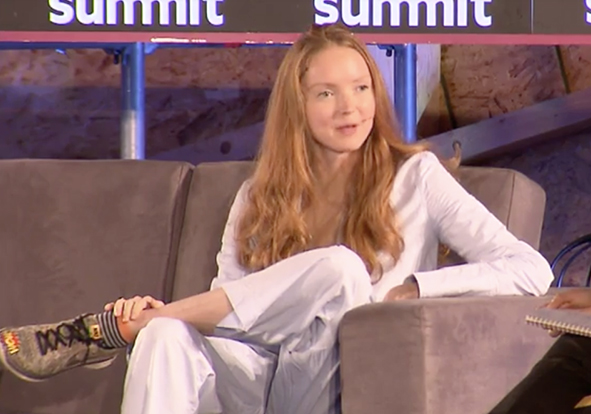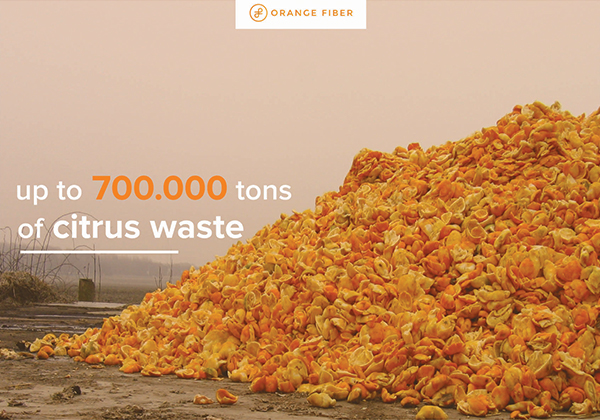Exhausted and buzzing. That’s how I would describe my digital hangover after recently returning from Lisbon for Web Summit 2016. One of the world’s biggest technology conferences, Web Summit is now in its 8th year and saw 53,000 people descend on the Portuguese capital for some serious networking, pitching, speaking and investing.
As well as the hundreds of start ups exhibiting, C-level executives and thought leaders came together from every sector imaginable. From Tinder’s founder Sean Rad to The Vatican’s Bishop Paul Tighe, speakers from around the globe offered fascinating insights on all things tech, social media and business. With one hell of a US presidential election taking place at the same time, conversations about the future were all the more charged and politicised.
Fashion and sustainability were hot topics on the Modum stage. This was the largest platform Web Summit has dedicated to fashion so far. Model and founder of Impossible, Lily Cole, was interviewed by Zing Tsjeng of VICE channel Broadly, on the subject of transparency in the fashion industry.
In an age where data and information are now so much more accessible, she discussed how brands should be telling their consumers how and where their products are made, helping them to make a conscientious decision on what they choose to buy. She also highlighted the importance of companies themselves being fully informed of what’s going on in their supply chain. Where do the materials come from? Who made them? How much energy did it take to produce them?
The discussion highlighted the problem of overwhelming the consumer with morality, especially when there are so many different ways of interpreting and defining ‘ethical’ and ‘sustainable’ practice. If a brand is simply transparent about what they do, it not only earns the trust of a consumer, products become imbued with value because of their story.
Lily Cole also demonstrated her own penchant for extending the longevity of products by wearing trainers she upcycled with badges (bearing the words ‘WOW!’ and ‘OMG’). A resourceful solution to fixing the holes that had formed in the fabric and a real example of how altering something you own can express individual style. The result obviously looked like an intentional design as she mentioned that friends kept asking her where she got her trainers from.
A conversation between founder of Buru 24/7 Miroslava Duma and Michael Beutler, Director of Sustainability at Kering, revealed some of the ways in which technology is advancing sustainable fashion. Kering are piloting a mobile app which allows a company to measure in monetary value, the costs and benefits they are generating for the environment. My EP&L (Environmental Profit & Loss) is designed to make “the invisible impacts of business visible, quantifiable and comparable”, ultimately steering business strategy.
Kering owns 19 designer brands including Stella McCartney who has become a trailblazer for ethical and sustainable manufacturing in the fashion industry. 53% of her Spring 2017 collection (below), has been ethically and sustainably sourced, with all their viscose deriving from certified forests in Sweden.
Featuring model Carmen Kass (and a gorgeous grey cat), Stella McCartney has created a video based around a model village raising awareness of the effect of deforestation on wildlife:
The role of technology in the innovation of raw materials was also raised, citing companies such as:
- Worn Again who are developing a chemical textile-to-textile ‘closed loop’ material
- Nike who are using recycled materials in 71% of their footwear
- 100 Percent Citrus by Orange Fiber, who have developed a textile from citrus juice byproducts.
It gets even more scientific. Companies are now working on animal free ‘lab grown’ leather, such as Modern Meadow. Known as ‘biofabrication’, the process involves using animal cells and collagen to create a leather ‘hide’. Leather tanning processes can be incredibly toxic, so in addition they are exploring ecological methods to tan and finish the leather.
Also speaking was Yael Aflalo, founder of the fashion brand Reformation. The brand designs and manufactures most of its clothes in its own factory in downtown Los Angeles, with all other garments produced in the U.S.A. or abroad using sustainable methods and materials. They also track how much each garment costs in terms of CO2 and water, measuring that data against the industry average.
Take a look at the Gemma dress (pictured below) on their website, and you’ll see how they calculate that the making of this particular dress released 11 pounds of CO2 compared to the industry standard of 18 pounds. You can read more about their initiatives here.
Eva Kruse, CEO of Danish Fashion Institute, revealed how compared to 10 years ago, fashion brands are much more willing to speak up about their manufacturing processes. She also made an important point that ultimately, you have to start with a good product; when it comes to clothes, even for the more ‘conscious’ millennials, the sustainability story is not enough. She says:
We buy clothes because of how they make us feel (…) Brands such as Kering and Reformation are leading the way in showing it’s possible to deliver super attractive products, with respect for people and the planet.
With the global apparel market valued at 3 trillion dollars, it’s alarming to think how much our economy is fuelled by the fashion industry, especially when it also happens to be one of the biggest polluters in the world. The message being driven home on the Modum stage was that we as consumers also have a lot of power in how we vote for certain brands. In conclusion, we need to be more curious, because data and technology can give us the answers.
I should also mention Web Summit’s fantastic stage set design by Catapult. The whole of centre stage was illuminated with hundreds of repurposed water tanks which were internally lit so that they formed an interchanging display. Let’s hope you can reuse them next year?
Check out the full talks over on the Modum Facebook page.
Header image by Dennis Flinsenberg











